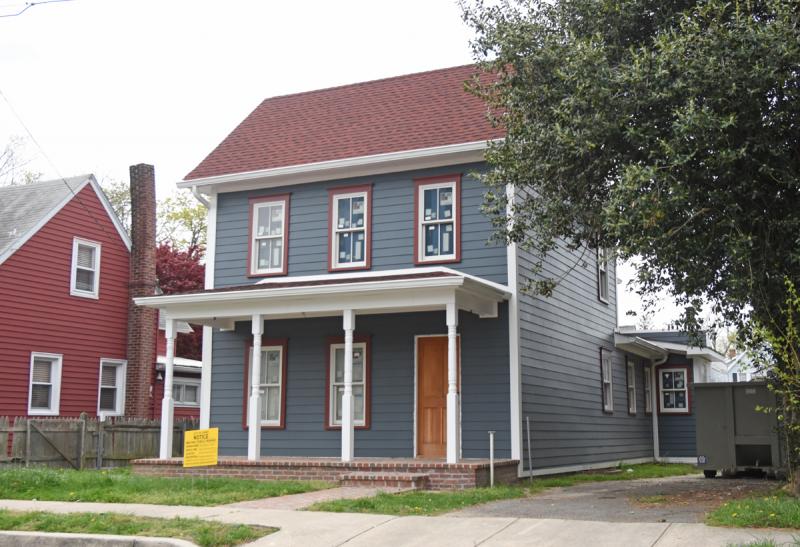A Lewes homeowner has been ordered to demolish a section of his Dewey Avenue home that he built without necessary permits.
The Delaware Supreme Court affirmed a Lewes Board of Adjustment decision from April 2017 that denied three variances sought after an addition to the home was built. In its action, the Supreme Court ruled state law allows municipalities to impose stricter guidelines for granting a variance than is described in state law. It overturned a Superior Court decision that found the board of adjustment relied on city code that was illegally more stringent than state code.
Lewes City Solicitor Glenn Mandalas said he’s informed homeowners, Debroah and Ernest Nepa, that they must begin work to bring the home into compliance with city code within 30 days.
The Nepa attorney Mark Dunkle said he’s reviewed the Supreme Court decision with his clients, and they will soon work with the city to fix the issue.
“He certainly wants to return the home to productive use after all this time,” Dunkle said.
The Nepas sought variances after the city issued a stop-work order in March 2016. During a routine site visit, assistant building inspector Robin Davis discovered the Nepas had begun work on a rear addition without necessary approvals.
In April 2017, the Nepas applied for three variances for the property, which they planned to resell, according to court documents. The variances sought to encroach on a side-yard setback and to build within a 10-foot required separation between a home and a garage. The home in the historic district was already nonconforming.
The board denied all three variances, finding that the Nepas’ situation was not unique and that the benefit of granting the variances did not substantially outweigh the detriment to neighbors.
At the April 2017 board of adjustment hearing, Ernest Nepa said the addition became necessary when a section of the rear roof collapsed into the kitchen following a nor’easter in February 2016. After stabilizing the structure, he poured a new foundation and began work on a nearly 15-foot addition off the back of the home. He said would be used as a master bedroom or additional family living space, which is becoming more convenient for Lewes’ aging population.
Dunkle argued the city’s standards for obtaining a variance are more strict than what’s outlined by state law, which he argued is illegal. Superior Court Judge E. Scott Bradley agreed and sided with the homeowners in an April 2018 decision.
However, in its June 10 decision, Delaware Supreme Court reversed Bradley and reinstated the decision of the board of adjustment.
“The state statute only prohibits the city from loosening the state law requirements for granting a variance,” wrote Justice Collins Seitz in an opinion for the majority. “The city is thus free to require stricter standards.”
Seitz wrote the case hinged on the wording of state law. Unlike other parts of the statute where “shall” is used, the section in question says boards of adjustment “may” grant variances.
“If the board is under no state statutory obligation to grant any variance, then a municipality is free to enact variance requirements stricter than those in state law,” Seitz wrote. “Variances are exceptions to zoning laws that promote uniformity in land use planning. Without minimum standards, municipalities could grant variances based on more lenient standards than state law, or no standards at all.”
Mandalas said the Superior Court ruling could have had major implications for historic districts statewide had it stood.
The ruling reaffirmed ordinances designed to protect historic structures are permissible, Mandalas said.
“The decision ensures that municipalities like Lewes may exercise appropriate restraints to preserve historically significant structures and to ensure new development conforms to standards appropriate for the community,” he said.
Justice James T. Vaughan Jr. also sided with the city, but for a different reason. In a concurring opinion, he wrote that he did not agree with his colleagues that the city can require stricter standards.
“Nothing in the statute states that it is setting only minimum standards for granting a variance or that a municipality is free to require stricter standards,” he wrote. “By using the word ‘may,’ [the statute] gives the board of adjustment – an entity separate and distinct from a municipality’s legislative body – the authority to grant or not grant variances.”
However, Vaughan wrote, the board of adjustment’s denial was appropriate in this case.
“In concluding that the applicants have not demonstrated an exceptional practical difficulty sufficient to warrant granting their request for variances, the board stated that it did not find that the variances could be granted without substantial detriment to the public good,” he wrote. “These findings ... are fatal to the appellee’s variance requests under the exceptional-practical-difficulty test.”
To view the opinion, go to https://courts.delaware.gov/Opinions/Download.aspx?id=290670.
Nick Roth is the news editor. He has been with the Cape Gazette since 2012, previously covering town beats in Milton and Lewes. In addition to serving on the editorial board and handling page layout, Nick is responsible for the weekly Delaware History in Photographs feature and enjoys writing stories about the Cape Region’s history. Prior to the Cape Gazette, Nick worked for the Delmarva Media Group, including the Delaware Wave, Delaware Coast Press and Salisbury Daily Times. He also contributed to The News Journal. Originally from Boyertown, Pa., Nick attended Shippensburg University in central Pennsylvania, graduating in 2007 with a bachelor’s degree in journalism. He’s won several MDDC awards during his career for both writing and photography. In his free time, he enjoys golfing, going to the beach with his family and cheering for Philadelphia sports teams.




















































